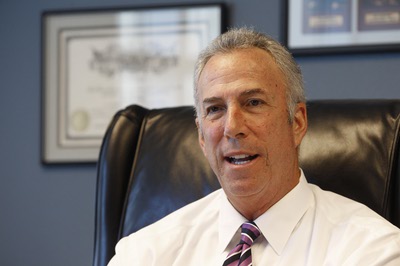Thursday, Sept. 5, 2019 | 2 a.m.
View more of the Sun's opinion section
Editor’s note: As he does every August, Brian Greenspun is taking some time off and is turning over his Where I Stand column to others. Today’s guest columnist is Clark County District Attorney Steve Wolfson.
Prosecutor's offices are often criticized for offering a person a “deal” or “plea bargain” in criminal cases. The reality is over 95% of the cases received by our office are resolved through plea bargains.
This is not unique to Las Vegas or the Clark County District Attorney’s Office; rather, it is entirely consistent with the national average. According to recent publications, 94% to 97% of state and federal cases are plea-bargained, and negotiations are on the rise.
Criminal cases are negotiated for practical reasons. In Clark County, for example, our office receives over 70,000 submissions each year from Southern Nevada law enforcement agencies. This large volume of cases is screened by seven experienced chief deputy district attorneys who determine whether the office will file criminal charges against a person. The current criminal justice system does not have the resources — not enough judges, courtrooms, prosecutors, defense attorneys or jurors — to process this vast number of cases if each were to proceed to trial.
The most practical and efficient way to resolve the majority of these cases is for the defense and the prosecution to negotiate the terms of the guilty plea agreement and agree to the terms of punishment. This process ensures that the case is resolved more quickly, thus saving time, stress and money for everyone involved. In reality, experienced defense attorneys and prosecutors generally are able to agree on the value of a criminal case. The guilty plea must then go before a judge who ultimately decides whether to accept the terms of the negotiation.
The goal of the prosecutor in every case is to see that all defendants are held accountable for the crime they committed, and to ensure our community is protected from those who may cause further harm if given the opportunity.
When a person pleads guilty, this does not mean they are getting away with no finding of guilt. On the contrary, they are accepting responsibility for their criminal actions and the corresponding punishment (or, in some cases, receiving counseling or treatment to prevent future criminal activity). That conviction will appear on their criminal record, and they may lose certain rights and privileges as a result.
Each case is evaluated on an individual basis. Many factors determine the final negotiation, including the strength or weakness of the evidence, the accused’s prior criminal history, seriousness of the offense, degree of harm to a victim, restitution, addiction issues, mental health concerns and others.
There are office policies in place to guide the deputy district attorneys handling the case. One of the most important policies is that the people who are directly affected by a crime are notified about what is happening with the case in which they are involved. This applies to the victim(s) of the case and the police officers who investigated and submitted the case for prosecution.
Because of this, the attorney handling a case routinely makes direct contact with the victim and police in order to allow them to express their views and ask any questions they may have concerning the proposed plea agreement.
Ultimately, the decision on how a case is handled rests with the Office of the District Attorney, but communication with affected parties is an important part of the process.
While the general public may hear about only a handful of high-profile cases, there are tens of thousands of cases that move through our court system every year that are resolved by plea agreements.
This is the standard process of a criminal case throughout the United States, and it involves input from both sides and ultimately approval from a judge. This process of “plea bargaining” cases exists in every major city in America.
The reality of our justice system is that it is not perfect, and both prosecutors and defense attorneys must rely on negotiations in most instances to resolve a case in a balanced and just way. If the parties cannot come to an agreement, there is always the option to take a case to trial and let a judge or jury determine the outcome. However, often that is a risk a defendant is not willing to take.
Like it or not, plea bargaining is a reality and a necessity in an overwhelming majority of criminal cases.
Steve Wolfson has been Clark County district attorney since 2012.

